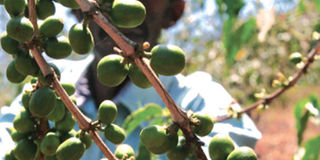Coffee pulls youth back to the farms

PHOTO | FILE A number of youths have taken up coffee farming, thanks to better prices.
What you need to know:
- Agriculture has not been attracting the youth even as developing countries suffer from joblessness. The picture is more grim in Kenya where the average age of a coffee farmer is 60
- But at Kangocho factory, Gikanda Cooperative Society in Mathira, the scenario is fast changing. Here, youths are entrenching themselves in the multi-billion shilling industry by forming welfare groups which lease neglected coffee trees from aged farmers
- A major setback, however, is reluctance by many elderly people to bequeath the cherished coffee tree to their younger and more energetic children
Improved coffee prices and good governance in cooperative societies are wooing hundreds of youths in Nyeri County to farms despite the fact that they have little control over land.
This is a trailblazing precedent for the $80 billion global industry where an emerging concern is the ageing population of coffee farmers.
Agriculture has not been attracting the youth even as developing countries suffer from joblessness. The picture is more grim in Kenya where the average age of a coffee farmer is 60.
But at Kangocho factory, Gikanda Cooperative Society in Mathira, the scenario is fast changing. Here, youths are entrenching themselves in the multi-billion shilling industry by forming welfare groups which lease neglected coffee trees from aged farmers.
The Coffee Board of Kenya attributes this renewed interest in coffee by youth in Mt Kenya West region to improving prices.
A major setback, however, is reluctance by many elderly people to bequeath the cherished coffee tree to their younger and more energetic children. Industry experts say this could be contributing to dwindling coffee production, which has been averaging 50,000 tonnes.
“The major hindrance for the youth engaging in coffee farming in the region is failure by parents to allocate the coffee farms to them,” the regional coffee advisory officer, Mr Charles Nyamweya, said in a report.
According to Mr Nyamweya, the enterprising youths are forming groups and jointly leasing neglected coffee trees from elderly farmers.
“We lease coffee trees from those who cannot take care of them. The society has embraced the groups and has registered them as individual members,” said Mr Joseph Nyaga.
At 38, Mr Nyaga is the chair of the factory and the youngest board member of Gikanda society.
His factory has 18 coffee production groups formed by youths and he heads one known as Freelancer. Others include Big River Revolving Fund, Kaugi Unity Self-Help, and Mwawa Mwawa. The four groups have 62 members and about 3,000 coffee trees between them.
During the lease period, youths nurture the trees to give them the maximum yield of about 40 kilogrammes a tree a year. This is far higher than the country average production of three kilogrammes a tree.
Apart from leasing trees, Freelancer also specialises in transporting coffee from farms to factories. The group leases a coffee tree for a minimum of five years at Sh30 a year.
After tending it, the group recovers its capital within the first year. Involvement of youths in farming has seen the society’s production register an upswing compared to others.
“Four hundred members of Kangacho factory are below 45 years. Given that these groups are making money from coffee is motivating many others and the number is growing,” said Mr Nyaga.
In the 2010/11 season, the factory produced one million kilogrammes of which 80 per cent was of the benchmark AA grade. Ndaroini and Gichathaini factories, also affiliated to Gikanda society, produced 800,000 kilogrammes each.
Big River, the pioneer coffee youth group started as a merry-go-round in 2004 by 24 youths, now has an annual turnover of Sh0.8 million. It started by leasing 150 trees, which it has increased to 4,000.
“We have reached a point of giving our members loans and farm inputs for the lucky ones who have coffee trees of their own,” says the chairman of the group, Mr John Ngure.
During the 2010/11 season, Kangocho posted the highest-ever payments in the cooperative sector at Sh131.30 a kilogramme, becoming a trend-setter in payments.
The chairman of Gikanda, Mr Charles Muriuki, said the society has a policy of encouraging and supporting young people to take up coffee farming.
“Involving the youth is something that coffee dealers are very happy about. There have been perennial fears that there will be no coffee in future unless youths are brought on board,” he said.
The official said the society has been encouraging youth groups to register as members to ensure continuity when the older generation retires.




